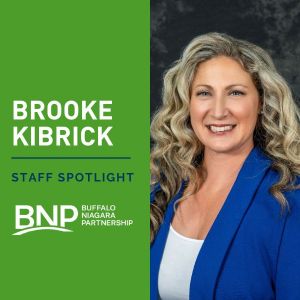5/6 Webisode: WNY Impact Survey Results
Blog Categories
May 6, 2020
The Partnership hosted a webisode to release the results of the WNY Impact Survey conducted in April.
The information gathered from the survey will be essential to better understanding how the public and private sectors can work together to address potential gaps in available resources now and during the inevitable economic recovery period that lies ahead. The survey asked employers to weigh in on a variety of topics including lost revenue, workforce impacts, and their ability to operate remotely.
Financial impact:
- 93% of respondents are experiencing a decline in revenue related to COVID-19
- Most report a loss of 50% or less of expected revenue
- 3 out of 5 businesses have postponed investment, many of them indefinitely
- 75% of respondents have applied or are planning to apply for federal business assistance loans
- 51% of businesses are reducing variable costs
- 43% are reducing fixed costs
- 2 out of 3 respondents report implementing a staffing change including reducing positions or adjusting wages/salaries
- More than 1/3 of businesses have reduced staff, mainly through temporary layoff or furloughs
- 60% of respondents have implemented a hiring freeze
Most pressing short-term concerns:
- 79% – Decline in revenue/sales
- 63% – Cash flow
- 42% – Wellbeing and safety of employees
Most pressing long-term concerns:
- 73% – Decline in revenue/sales
- 56% – Cash flow
- 40% – Cash reserves
How government can be most helpful:
- 60% – Expand and/or streamline federal loan programs
- 55% – Payroll tax cut
- 41% – Fast-track the release of reimbursements for contract work
- 28% – Repeal or suspension of certain reporting requirements
Readiness to work remotely:
- 1 out 3 respondents report not being prepared to switch to remote operations
- A quarter of responding businesses were prepared to deploy remote operation plans
- 1 in 5 respondents still do not have a functioning remote plan in place
Biggest concerns for the community:
- 35% – Permanent closure of local small businesses
- 31% – Health of the U.S. economy
Watch the Presentation Below
*****
The Buffalo Niagara Partnership is committed to providing employers with the latest information and resources to help you deal with COVID-19 and its impact on our community, state, and nation. Visit our Events Page and Resource Page, as they are updated regularly to provide you with the most current information.
We will continue to follow up as more information becomes available. Given the fluidity of this situation, please feel free to reach out to us with questions at connect@thepartnership.org and even more importantly, if you are willing to share best practices.
Related Posts
Staff Spotlight: Meet Brooke Kibrick
We are pleased to welcome Brooke Kibrick, Director of Events & Programs, as our latest Staff Spotlight.
Staff Spotlight: Meet Kenya Hobbs
We are pleased to welcome our new Director, Community Engagement & Equity Initiatives, Kenya Hobbs as our latest Staff Spotlight.
COVID-19 Bulletin: Tax Credits Available for COVID-Related Costs
Small businesses can now apply for a new tax credit to help offset COVID-19 costs. The $250 million COVID-19 Capital Costs Tax Credit Program will cover up to 50% of eligible expenses, for a maximum benefit of $25,000.
Manufacturing Council Hosts: CHIPS+ Impact on WNY Manufacturers
The federal CHIPS and Science Act of 2022, known as CHIPS+, was signed into law by President Biden on August 9, 2022. This new legislation directs $52 billion toward renewing the heavily outsourced U.S. semiconductor manufacturing sector and reinvigorating U.S. chip research and development activities.




